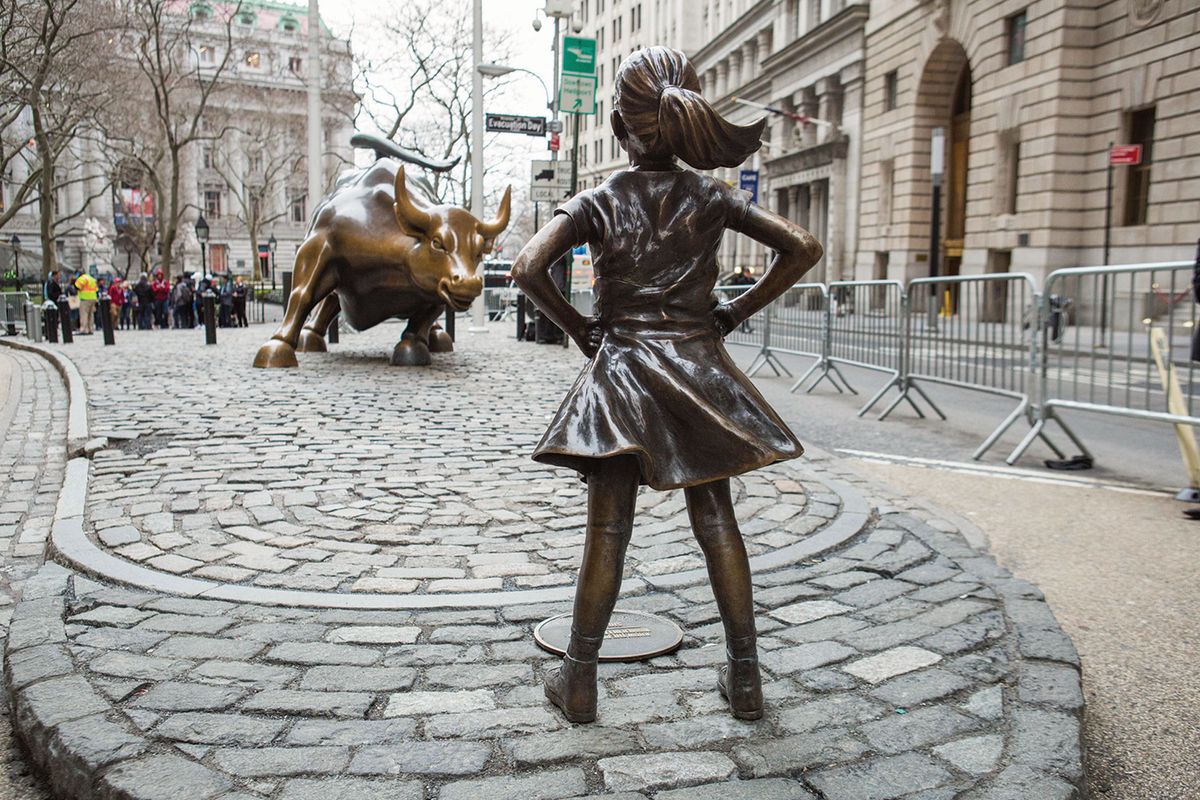Kristen Visbal, sculptor of Lower Manhattan’s famous Fearless Girl, is hoping the buoyant market for non-fungible tokens (NFTs) will help her pay millions of dollars in legal fees after becoming locked in an almost three-year legal battle with the Wall Street firm that installed the work near Wall Street.
State Street Global Advisors (SSGA) installed Visbal’s bronze as part of a publicity campaign to promote gender parity in the financial services sector.
The artist, who says she has accrued more than $3m in legal fees as a result of the SSGA lawsuit, plans to launch three sets of NFTs featuring images and videos of the statue this month to “free Fearless Girl from the legal web she has been ensnared in”.
The case stems from a dispute between Visbal and SSGA that began in February 2019 over the terms of their agreement regarding use of the statue’s name and image. Visbal had recently struck an agreement with an Australian law firm to install an edition of Fearless Girl in Melbourne. Sales of other editions of the statue violated the terms of the original contract, SSGA alleged, as did Visbal’s appearance at the 2019 Women’s March in Los Angeles with an edition of the sculpture in tow.
The firm claimed that the additional statues undermine SSGA’s trademark rights to Fearless Girl and “weakens the goodwill associated with SSGA’s Fearless Girl brand and campaign”. (A lawyer for SSGA did not respond to multiple requests for comment.)
While the lawsuit over sculptural editions of Fearless Girl drags on—the parties are working toward a settlement and a mediation session is scheduled for 13 December—Visbal says she is “legally entitled to create derivative works such as the digital artworks presented in an NFT”.
But, according to intellectual property lawyer Jeff Gluck, Visbal’s contract with SSGA may also restrict her right to produce digital works. “The intellectual property laws that govern physical collectibles, physical items, are the same set of laws that govern digital collectibles,” Gluck says. “So if you don’t have the rights to make posters or prints or T-shirts or any other type of commercial reproduction of something, then you likely don’t have the rights to make an NFT out of it, unless that right has been explicitly granted.”
Despite its disputed legal standing, Fearless Girl may be uniquely suited to being adapted into a digital collectible and sold on NFT marketplaces. The sculpture became a global sensation after it was installed in the early hours of International Women’s Day (8 March) 2017 opposite Arturo Di Modica’s famous sculpture Charging Bull (1989) in Manhattan’s Financial District. It served as the centerpiece of a public relations campaign by SSGA to encourage greater gender diversity in financial sector workplaces. Later that year, the firm paid $5m to settle allegations that it paid female employees less than their male colleagues, and Black executives less than white workers in similar positions.
In 2018, following allegations by Di Modica that Fearless Girl’s placement violated his rights by changing the meaning of his bovine behemoth, Visbal’s statue was relocated to a spot opposite the New York Stock Exchange. That new perch is now in peril, as a three-year permit from New York City’s Landmark Preservation Commission is due to expire at the end of November. SSGA has lobbied to have it extended.


